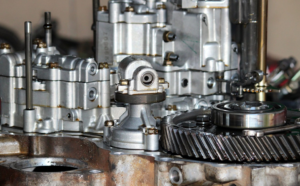Have you found your truck or car shaking at high speed when you drive around Langley, BC? We have a lot of clients who say, “My car shakes when I drive on the highway, but I don’t know why.” Here are seven reasons why you may be experiencing this.

Image by Joshua Woroniecki from Pixabay
Tire and Wheel Problems
Not surprisingly, there are multiple issues with wheels and tires that can cause vehicle shaking at high speeds. One of these is unbalanced tires, which doesn’t typically cause shaking until you hit about 88 kilometres per hour. Not only is this uncomfortable, but it can result in flat worn spots on the tires, so you want to address it ASAP.
Low tire pressure can also cause high-speed vibration. Whether you are overdue for some air or have intentionally underinflated tires because you mostly drive off-road, so before you drive that 30 minutes to the next Canadian town over, you may want to fix this to see if it stops the shaking. (It’s also a safety concern.)
Tires out of alignment will usually wear unevenly, often more on one side of the tire than the other. Once this happens, it can cause shaking of the vehicle too.
Damaged wheel bearings are yet another cause of high-speed shaking. Typically, this will manifest as shaking primarily of the steering wheel when driving on the highway.
Steering System Malfunctions
Closely related to your wheels and tires is the steering system. This may be whole-vehicle shaking, or perhaps the car steering vibrates at high speed.
You could have a power steering fluid leak. This can make the vehicle difficult to steer and also cause it to shake, especially if you’re having difficulty controlling the wheel. Never drive with a power steering fluid leak, as you could eventually lose steering capacity altogether.
Faulty tie rod ends are another culprit we see with car shaking. Tie rods are part of the system that connects your steering to your wheels. They’re considered both part of your steering system and part of your suspension system (see below). If your automobile shakes when turning but not when driving straight, the tie rod ends are a likely problem.
Suspension Issues
Your suspension system helps absorb shock and give you a smooth ride. So it’s not out of the question for suspension problems to result in shaking at speed. Some typical suspension issues related to this could be:
- Ball joints need replacement
- Misaligned suspension from driving on rough terrain
- Worn-out or loose components like bearings or control arm bushings
Bent Axle
Was your vehicle in an accident previously? Is it possible the axle was damaged? This could definitely cause car or van shaking on the highway. A bent axle can also be the result of hitting a curb or a deep pothole.
Brake Troubles
Does the shaking you experience in your auto happen only when you brake? That’s a sign your brakes are involved in the phenomenon. Worn or warped brake rotors are one common cause of shaking while braking.
A faulty brake caliper is another. If it’s the latter, you may smell a strong, unpleasant odour like something is burning when you brake hard. Because brakes are a vital safety feature in your vehicle, it’s important to get this checked by brake experts right away.
Engine Problems
There are a multitude of different engine problems that can precipitate high-speed vehicle shaking. These include:
- Bad or loose spark plugs
- Fuel system delivery malfunction
- Fuel or air filter that needs replacement
- Failing timing belt
With all of these problems above, there can be inconsistent energy or speed being produced by the engine, which is transformed into shaking the faster you go.
Another problem related to the engine that can cause shaking is a loose or faulty motor mount. If the engine itself is moving around under the hood, it can translate to overall vehicle motion the more you have your foot to the floor.
Motor mounts are particularly essential with newer model vehicles because they reduce vibrations when part of the engine automatically shuts off to improve efficiency at steady cruising speeds — a recent bit of automotive technology. When should you be suspicious that your motor mount needs to be tightened or replaced?
- The vehicle starts to shake at speeds as low as 64 kph.
- Shaking only occurs on the flat but not driving up a hill.
- You hear a sound like going over rumble strips with the shaking.
Body and Aerodynamic Factors
Occasionally the shape of a vehicle can cause shaking as well. This shouldn’t happen with a car off the factory floor, but adding a rack to the roof or rear for skis or bikes could affect its aerodynamics. Even a mirror being out of place could cause slight vibrations. Another common aerodynamic cause of high-speed shaking is a door or hatch being accidentally left open or not latching properly.
Usually shaking caused by this last category is something you can fix yourself. However, all of the other issues mentioned above require a trip to your mechanic to sort out what’s going on. Don’t delay and hope the high-speed vibrating will get better on its own — schedule an appointment at the shop immediately for your own safety and the longevity of your investment.




